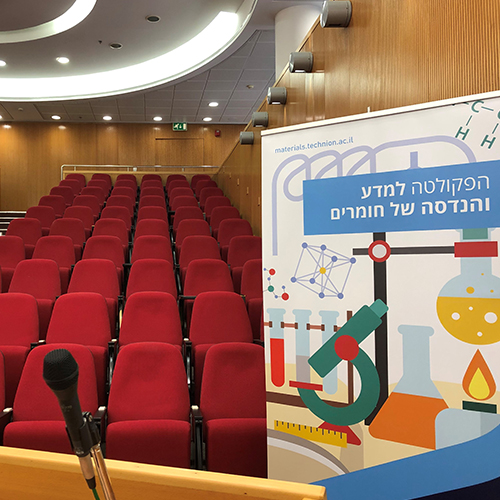
11/07/2025
David Wang Auditorium, 3rd floor, Dalia Maydan Bldg.
Ms. Shahar Cohen MSc candidate
Department of Materials Science and Engineering
Technion – Israel Institute of Technology, Haifa
The rising demand for renewable energy has sparked interest in energy storage technologies, necessitating improved electrochemical efficiency in these devices. Spinel oxides are a class of solids, known for their interesting properties, offer various avenues for optimizing device performance. Typically, spinels conduct electricity through the small-polaron mechanism, or self-trapped charge carriers. However, their poor conductivity remains a challenge to their wider use. To address this challenge, researchers have explored altering the stoichiometry and introducing defects to the structure of spinel oxides, enabling manipulation of their electrical conductivity to achieve higher or lower values. Prior prediction of these conductivity properties through simulations based on Density Functional Theory (DFT) is highly desirable. NiFe2O4 (NFO), a well-known spinel oxide, has attracted considerable attention for potential applications in energy storage and catalysis. Oxygen vacancies within the lattice can significantly influence the electronic structure of NFO, emphasizing the need to comprehend the relationship between oxygen vacancies and the material’s electronic properties. This research focuses on investigating the impact of oxygen vacancies on the electronic structure and conductivity of NFO. The findings indicate that defected structures in NFO create additional states within the band gap, enhancing electronic conductivity. By employing DFT calculations, this research explores NFO’s properties, offering valuable insights for electronic devices and catalytic applications.
BIO
Shahar Cohen is a graduate student in the Department of Materials Science and Engineering at the Technion. She is working in the computational materials group, advised by Prof. Maytal Caspari-Toroker. Cohen completed her B.Sc in Chemistry and Material Engineering in 2021.
Her research is focused on theoretical calculations for charge transport in spinel oxide NiFe2O4(NFO). Specifically, Shahar is investigating the effect of oxygen vacancies on the electronic structure and conductivity of the material by using density functional theory (DFT) calculations.
Shahar’s background makes her a valuable asset to the field of materials science


